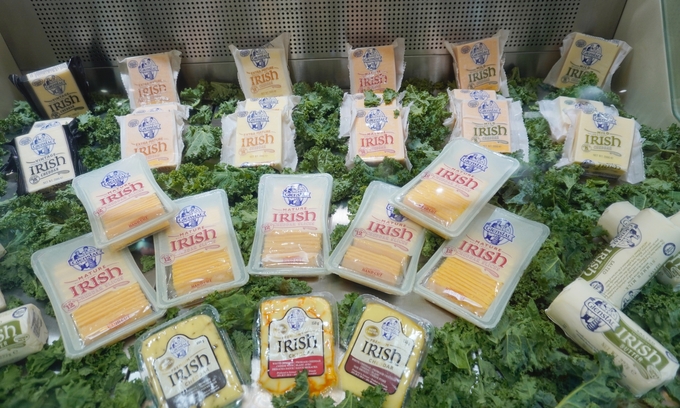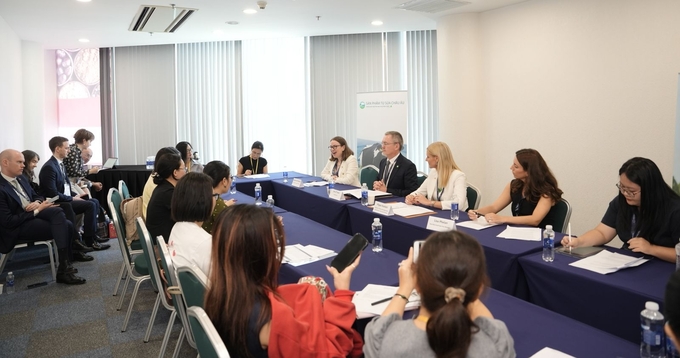(VAN) The CEO of Bord Bia emphasized that Ireland stands out for its green production and strict standards in food hygiene, safety, and sustainability.
On October 9, Fi Vietnam 2024, the premier international exhibition for food and beverage ingredients in Vietnam, officially kicked off at the Saigon Exhibition and Convention Center in District 7, Ho Chi Minh City. The event gathered 175 leading companies from 30 countries and territories.
Fi Vietnam 2024, running from October 9 to 11, is part of the Fi Global exhibition series organized by Informa Markets Group, in collaboration with the Ho Chi Minh City Food and Foodstuff Association (FFA), the Vietnam Beer – Alcohol – Beverage Association (VBA), the Vietnam Association of Food Science and Technology (VAFoST), and other partners.

Ireland’s pavilion at Fi Vietnam 2024 drew significant attention with its diverse range of industries and products, including milk, cream, cheese, and butter. Photo: Hong Tham.
During the event, an Irish delegation met with the press. Ms. Pippa Hackett, Minister of State for Agriculture, Food and the Marine of Ireland, shared: “Vietnam is a vital trade partner for Ireland in the agriculture and food sectors. Our recent state visit reaffirmed our commitment to strengthening this relationship. Following the historic visit of Vietnam’s leadership to Ireland, we are excited to deepen cooperation in the economic, trade, and agricultural sectors.”
“With a focus on increasing exports, particularly in dairy products, seafood, and pork, we are confident that enhancing this partnership will create opportunities for growth and mutual success in the years ahead,” added Ms. Pippa Hackett.

Ms. Pippa Hackett, Minister of Agriculture, Food and the Marine of Ireland shared: “Vietnam is an important trading partner in the agricultural and food sector of Ireland”. Photo: Hong Tham.
“We recognize the growing interest among Vietnamese consumers in the transparency of food origins. That’s why we’re very optimistic about the potential for Irish food and beverage products to expand in Vietnam, as Ireland is distinguished by its green production methods and strict standards for food cleanliness, safety, and sustainability. We believe that, with Ireland’s high-quality products and rigorous production standards, we are well-positioned to meet the needs of Vietnamese consumers,” said Mr. Jim O’Toole, CEO of the Irish Food Authority (Bord Bia).
“Our Irish producers set the global benchmark for sustainable production, honoring the responsibility we all share towards the planet, society, and future generations. Ireland is renowned for producing clean, high-quality, and innovative food and drink products – reputation built over decades of supplying international markets,” Mr. O’Toole added.
Irish Ambassador to Vietnam, Deirdre Ni Fallún, affirmed that both Vietnam and Ireland are forward-looking nations with much to offer each other. She emphasized that Ireland, as a supplier of sustainable, safe, and premium-quality food and beverages, is ready to further strengthen this partnership, supporting the development of Vietnam’s food and beverage industry while increasing consumer choice with world-class products.
“We are two nations with proud agricultural traditions and vibrant, growing economies. We believe that the best way forward lies in knowledge-sharing and partnership. The recent signing of the Ireland-Vietnam Agri-Food Partnership (IVAP) and the Memorandum of Understanding (MOU) on enhanced cooperation between the governments of Ireland and Vietnam are strong testaments to this,” Ambassador Ni Fallún highlighted.

The Irish delegation addressed the press on the morning of October 9 in Ho Chi Minh City. Photo: Nguyen Thuy.
Currently, Vietnam’s food and beverage market is experiencing a rising demand for diversity and quality in food, beverages, and functional products, with a national median age of around 30 years.
With the food and beverage (F&B) industry in Vietnam growing at an average annual rate of 10-12%, there are significant opportunities for international F&B companies to penetrate the market through unique local products produced and processed with modern, safe practices and transparent sourcing. In turn, Vietnamese businesses can benefit from partnerships to enhance the export of domestic products to Ireland.
As part of the cooperation framework established in the MoU, Vietnam and Ireland will advance programs on food safety, livestock disease prevention, and sustainable farming practices. Both ministries agreed to a strategy that will strengthen cooperatives’ capacities to develop green, safe, climate-resilient, and carbon-reducing agricultural systems.
The two nations will collaborate on research and vaccine production, share experiences in epidemiology, and jointly work on food safety management and microbial risk analysis. Training for food safety analysts, particularly in monitoring chemical residues and veterinary drugs, will also be a key aspect of the cooperation program.
Agriculture News | Agri Products Price



